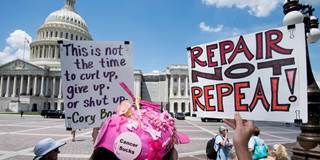Mitigating the risks confronting the global economy today will require deep structural reforms – the kind that can be implemented only as part of a long-term policy agenda. Democracies seem to be at a disadvantage in this respect, but that need not be the case.
NEW YORK – Despite positive indicators, the global economy remains beset with risks. And because virtually every one of those risks arises from structural challenges, mitigating them will require long-term thinking by leaders. Unfortunately, there is not a lot of that on offer nowadays, particularly in the world’s democracies.
The problem lies in the disconnect between political and economic cycles. A normal economic cycle lasts 5-7 years. But, according to the McKinsey Global Institute, the average tenure of a G20 political leader has fallen to a record-low 3.7 years (compared to six years in 1946). Focused on winning the next election, politicians often implement policies that will bring short-term rewards, even at the cost of long-term growth or stability.
This trade-off is exemplified by widening fiscal deficits. In the United States, according to the Congressional Budget Office, the budget deficit is on course to triple over the next 30 years, from 2.9% of GDP in 2017 to 9.8% in 2047, owing to the effects of tax cuts and other budget-busting measures implemented to appeal to voters (or, equally important, to appease donors). This undercuts the government’s ability to make forward-thinking investments in areas like education and infrastructure.

NEW YORK – Despite positive indicators, the global economy remains beset with risks. And because virtually every one of those risks arises from structural challenges, mitigating them will require long-term thinking by leaders. Unfortunately, there is not a lot of that on offer nowadays, particularly in the world’s democracies.
The problem lies in the disconnect between political and economic cycles. A normal economic cycle lasts 5-7 years. But, according to the McKinsey Global Institute, the average tenure of a G20 political leader has fallen to a record-low 3.7 years (compared to six years in 1946). Focused on winning the next election, politicians often implement policies that will bring short-term rewards, even at the cost of long-term growth or stability.
This trade-off is exemplified by widening fiscal deficits. In the United States, according to the Congressional Budget Office, the budget deficit is on course to triple over the next 30 years, from 2.9% of GDP in 2017 to 9.8% in 2047, owing to the effects of tax cuts and other budget-busting measures implemented to appeal to voters (or, equally important, to appease donors). This undercuts the government’s ability to make forward-thinking investments in areas like education and infrastructure.